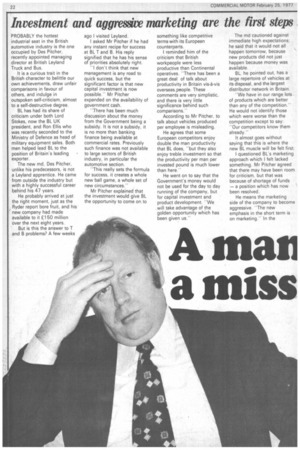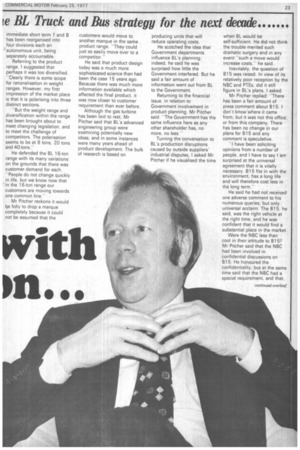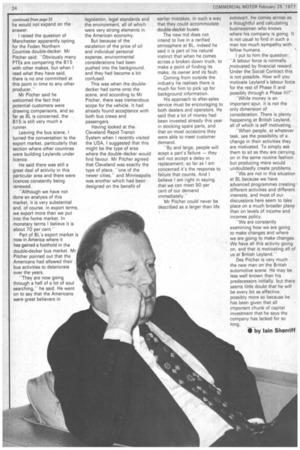Investment and aggressive marketing are the first steps
Page 26

Page 27

Page 28

If you've noticed an error in this article please click here to report it so we can fix it.
le BL Truck and Bus strategy for the next decade.......
PROBABLY the hottest industrial seat in the British automotive industry is the one occupied by Des Pitcher, recently appointed managing director at British Leyland Truck and Bus.
It is a curious trait in the British character to belittle our own achievements, draw unfair comparisons in favour of others, and indulge in outspoken self-criticism, almost to a self-destructive degree.
BL has had its share of criticism under both Lord Stokes, now the BL UK president, and Ron Ellis who was recently seconded to the Ministry of Defence as head of military equipment sales. Both men helped lead BL to the position of Britain's leading exporter.
The new md, Des Pitcher, unlike his predecessors, is not a Leyland apprentice. He came from outside the industry but with a highly successful career behind his 47 years.
He probably arrived at just the right moment, just as the Ryder report bore fruit, and his new company had made available to it £150 million over the next eight years.
But is this the answer to T and B problems? A few weeks ago I visited Leyland.
I asked Mr Pitcher if he had any instant recipe for success at BL T and B. His reply signified that he has his sense of priorities absolutely right.
"I don't think that new management is any road to quick success, but the significant factor is that new capital investment is now possible." Mr Pitcher expanded on the availability of government cash.
-There has been much discussion about the money from the Government being a subsidy. It is not a subsidy, it is no more than banking finance being available at commercial rates. Previously such finance was not available to large sectors of British industry, in particular the automotive section.
"This really sets the formula for success, it creates a whole new ball game, a whole set of new circumstances."
Mr Pitcher explained that the investment would give BL the opportunity to come on to something like competitive terms with its European counterparts.
I reminded him of the criticism that British workpeople were less productive than Continental operatives. "There has been a great deal of talk about productivity in Britain vis-a-vis overseas people. These comments are very simplistic, and there is very little significance behind such comparisons."
According to Mr Pitcher, to talk about vehicles produced per employee is misleading.
He agrees that some European competitors enjoy double the man productivity that BL does, "but they also enjoy treble investment so that the productivity per man per invested pound is much lower than here."
He went on to say that the Government's money would not be used for the day to day running of the company, but for capital investment and product development. "We will take advantage of the golden opportunity which has been given us." The rnd cautioned against immediate high expectations; he said that it would not all happen tomorrow, because new products did not just happen because money was available.
BL. he pointed out, has a large repertoire of vehicles at Its disposal, and the largest distributor network in Britain.
"We have in our range lots of products which are better than any of the competition. He would not identify those which were worse than the competition except to say: "Our competitors know them already."
It almost goes without saying that this is where the new BL muscle will be felt first.
I questioned BL's marketing approach which I felt lacked something. Mr Pitcher agreed that there may have been room for criticism, but that was because of shortage of funds — a position which has now been resolved.
He means the marketing side of the company to become aggressive_ -The new emphasis in the short term is on marketing.In the
immediate short term T and B has been reorganised into four divisions each an /autonomous unit, being separately accountable.
Referring to the product range, I suggested that perhaps it was too diversified. "Clearly there is some scope for rationalisation in weight ranges. However, my first impression of the market place is that it is polarising into three distinct sections.
"But the weight range and diversification within the range has been brought about to meet changing legislation, and to meet the challenge of competitors. The polarisation seems to be at 8 tons, 20 tons and 40 tons.'
He defended the BL 16-ton range with its many variations on the grounds that there was customer demand for each. "People do not change quickly in life, but we know now that in the 16-ton range our customers are moving towards one common line."
Mr Pitcher reckons it would be folly to drop a marque completely because it could not be assumed that the customers would move to another marque in the same product range. "They could just as easily move over to a competitor."
He said that product design today was a much more sophisticated science than had been the case 15 years ago. Because there was much more information available which affected the final product, it was now closer to customer requirement than ever before.
Although the gas turbine has been laid to rest, Mr Pitcher said that BL's advanced engineering group were examining potentially new ideas, and in some instances were many years ahead of product development. The bulk of research is based on producing units that will reduce operating costs.
He scotched the idea that Government departments influence BL's planning; indeed, he said he was surprised how little the Government interfered. But he said a fair amount of information went out from BL to the Government.
Returning to the financial issue, in relation to Government involvement in product planning.. Mr Pitcher said: "The Government has the same influence here as any other shareholder has, no more, no less.
Turning the conversation to BL's production disruptions caused by outside suppliers' industrial disputes, I asked Mr Pitcher if he visualised the time
self-sufficient. He did not think the trouble merited such dramatic surgery and in any event "such a move would increase costs,he said.
Inevitably, the question of B15 was raised. In view of its relatively poor reception by the NBC and PTEs, did it still figure in BL's plans, I asked.
Mr Pitcher replied: -There has been a fair amount of press comment about B15. I don't know where it came from, but it was not this office, or from this company. There has been no change in our plans for B15 and any comment is speculative.
"I have been soliciting opinions from a number of people, and I have to say I am surprised at the universal agreement that it is vitally necessary. B15 fits in with the environment, has a long life and will therefore cost less in the long term."
He said he had not received one adverse comment to his numerous queries, but only universal acclaim. The B15, he said, was the right vehicle at the right time, and he was confident that it would find a substantial place in the market.
Were the NBC less than cool in their attitude to B15? Mr Pitcher said that the NBC had been involved in confidential discussions on B15. He honoured the confidentiality, but at the same time said that the NBC had a special requirement, and that,
continued overleaf
continued from page 23
he would not expand on the answer.
I raised the question of Manchester apparently opting for the Foden Northern Counties double-decker. Mr Pitcher said: "Obviously many PTEs are comparing the B15 with other makes, but when I read what they have said, there is no one committed at this point in time to any other producer."
Mr Pitcher said he welcomed the fact that potential customers were drawing comparisons, and so far as BL is concerned, the BI 5 is still very much a runner.
Leaving the bus scene, I turned the conversation to the export market, particularly that section where other countries were building Leylands under licence.
He said there was still a great deal of activity in this particular area and there were licences constantly being renewed.
"Although we have not done an analysis of this market, it is very substantial and, of course, in export terms, we export more than we put into the home market. In monetary terms I believe it is about 70 per cent."
Part of BL's export market is ;now in America where it has gained a foothold in the double-decker bus market. Mr Pitcher pointed out that the Americans had allowed their bus activities to deteriorate over the years.
"They are now going through a hell of a lot of soul searching," he said. He went on to say that the Americans .were great believers in
legislation, legal standards and the environment, all of which were very strong elements in the American economy.
But because of the escalation of the price of oil and individual personal expense, environmental considerations had been pushed into the background, and they had become a bit confused.
This was when the doubledecker had come onto the scene, and according to Mr Pitcher, there was tremendous scope for the vehicle. It had already found acceptance with both bus crews and passengers.
Having looked at the Cleveland Rapid Transit System when I recently visited the USA, I suggested that this might be the type of area where the double-decker would find favour. Mr Pitcher agreed that Cleveland was exactly the type of place, "one of the newer cities," and Minneapolis was another which had been designed on the benefit of earlier mistakes, in such a way that they could accommodate double-decker buses.
The new md does not intend to live in a rarified atmosphere at BL, indeed he said it is part of his natural instinct that when he comes across a broken down truck, to make a point of finding its make, its owner and its fault.
Coming from outside the industry he realises there is much for him to pick up for background information.
His approach to after-sales service must be encouraging to both dealers and operators. He said that a lot of money had been invested already this year in stocking spare parts,. and that on most occasions they were able to meet customer demand.
-By and large, people will acept a part's failure -they will not accept a delay in replacement; so far as I am concerned it's the response to failure that counts. And I believe I am right in saying that we can meet 90 per cent of our demand immediately.
Mr Pitcher could never be described as a larger than life extrovert. He comes across as a thoughtful and calculating businessman who knows where his company is going. It is not usual to find in such a man too much sympathy with fellow humans.
I put to him the question: "A labour force is normally ,motivated by financial reward. :Under the Social Contract this is not possible. How will you motivate Leyland's labour force for the rest of Phase II and possibly through a Phase III?"
-While money is an important spur, it is not the only dimension of consideration. There is plenty happening at British Leyland, all of which is self motivating.
"When people, at whatever task, see the possibility of a change in their activities they are motivated. To simply ask them to sit as they are carrying on in the same routine fashion but producing mOre would undoubtedly create problems.
-We are not in this situation at BL because we have advanced programmes creating different activities and different interests, and most of our discussions here seem to take place on a much broader plane than on levels of income and incomes policy.
"We are constantly examining how we are going to make changes and where we are going to make changes We have all this activity going on, and that is motivating all of us at British Leyland."
Des Pitcher is very much the new man on the British automotive scene. He may be less well known than his predecessors initially, but there seems little doubt that he will be every bit as effective, possibly more so because he has been given that all important chunk of capital investment that he says the company has lacked for so long.
• by lain Sherriff
when BL would be






























































































